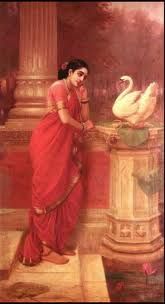Hamsa ManavalliA Chapter by DayranThe Mother of Man
Hamsa Manavalli The Mother of Man
Author's Note : This essay is written mainly for an Asian audience. However it creates references to the practice of motherhood everywhere. It is based upon Indic traditional writings as they perceived the reality of the feminine condition with regards child-bearing, raising the kids and coming to cope with family life. In this regard, references are also made to Venus and Mariamman, as the mother goddesses who inspired such writings with their knowledge and experiences. On a day, much like today, the grand lady Venus spotted her lover going for his usual boar hunt. It was the tradition of men, at that time, to kill boars as a symbol of the personal sacrifice of the male vanity. She had called to him to warn him to be careful. Sadly, on that tragic day, he lost his life to a vicious boar that defied all his arrows and came to plunge his tusks into the man she loved. Her loss knew no bounds and it cast her into an abyss of fear and anxiety about her condition. Her condition, in the service of man was an important one. She is the goddess of love and fertility and it has always been a powerful impulse in the body-mind of women to safeguard that position clearly. As she came to engage the issues of such an undertaking by women, she came to study and understand the strong symbolism that the body-mind of women are subjected to. Unlike their male counterparts, who create a reliance on science and the bountiful pharmacological industry, women respond to an intrinsic experience of their bodies that comes from the stars to the homes of the faithful and loving. The reproduction function draws itself from the early biological life of trees, the animals and the life of humans. It brings the body of the woman into a very intense and integrated function of cultivating the tissue of the child and to provide sustenance for the child's early years. In that, she comes to engage another life other than her own, and to care for it with a single mind of concern that eventually forms the development of the child's own mind. In coming to terms with her own realities, it has become incumbent on a woman to cultivate an organization of her life and priorities that is consistent with such a role. In such a condition, the woman is helped by the biological and ionization function of the Jivatman to cultivate an experience that is equal to the concept of the impersonal Brahman. In that, she views her reproduction function as an act of nature and shares with it, her intuitive understanding of the experience. Indic writings refer to this part of the creative function as the original sakthi of Brahman and is the basis of Hinduism writings to-date on the traditional understanding of the role of Gods, the divinity issue and the life and death process. It is also the basis of studies in Buddhism and Taoism on the principles of physical reality. In a recent development, science has come to view the nature of religious and philosophical studies as based on the experience of human evolution and development. Courses are being offered at several universities on ' cultural evolution ' that is expected to receive special interests in the years ahead. However, in the home, the Indian mother today is trained on Indic concepts of the Hamsa or Swan. ' Hamsa Manavalli ' in all its various definitions, is the process by which a woman comes to receive in her arms, the most powerful knowledge available in the world today, on the issues of how a person lives their life with love and intelligence. To an untrained mind, such experiences of the feminine feels at times, like a lot of ' mumbo jumbo.' The evidence however tells another story. The temples and monasteries of the East, continue to take countless aspirants every year who pursue a life of knowledge and understanding, drawn from such experiences. The Indian culture continues to rely on the writings of sages and rishis, whose fundamental premise to life, is founded on the principles of training the mind, to create acceptance for that which the body-mind, already perceives by its own mechanism. In a final analysis, one would be hard-pressed to say it is empirical knowledge, by the usual conventions by which we define that term. It is however, the best we have. Today, it's climbing out of the shadows and is taking center-stage in a common sense relation to the issues of life, death and the pursuit of happiness. It is a start, to what this author believes, is a new view of the life positive, in the world. © 2011 Dayran |
Stats
284 Views
1 Review Shelved in 1 Library
Added on December 6, 2011Last Updated on December 6, 2011 AuthorDayranMalacca, MalaysiaAbout' Akara Mudhala Ezhuththellaam Aadhi Bhagavan Mudhatre Ulaku ' Translation ..... All the World's literature, Is from the young mind of the Original Experiencer. .. more..Writing
|


 Flag Writing
Flag Writing